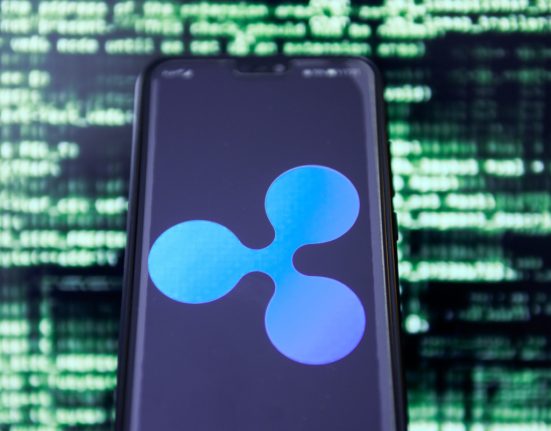You’re at the airport, connected to public Wi‑Fi, and trying to pay your credit card bill. You hit “Log In”, and suddenly the screen freezes, reloads, or worse, locks you out. Banks today are picky about where and how you connect. Add a VPN to the mix, and things can get even trickier. Still, that doesn’t mean VPNs are a bad idea for banking. In fact, more than 1 in 3 users now rely on VPNs to protect their online transactions and hide sensitive activity from trackers, snoops, or bad Wi‑Fi setups. The real challenge is finding one that offers privacy without triggering your bank’s security alarms.
Some VPNs get flagged due to unstable IP addresses, while others drop the connection at the worst time, breaking two-factor logins or showing you as halfway across the world. But the right VPN for banking keeps your session encrypted, your location consistent, and your bank app running like nothing happened.
We tested five of the best VPNs for online banking across real platforms, public networks, and devices you actually use. If you want to stay secure without getting locked out, start here.
Is It Safe to Use a VPN for Online Banking?
The short answer is yes, using a trusted VPN for banking is one of the smartest ways to go about your financial journey. It encrypts your traffic, shields you from hackers on sketchy networks, and keeps your data private from your internet provider. But as with anything online, the fine print matters.
When you connect to your bank’s website or app, sensitive data like login credentials, account balances, and transaction history gets transmitted. Without a VPN, that data moves in plain sight on public networks. Coffee shop Wi‑Fi, airport lounges, and even hotel networks can be breeding grounds for man-in-the-middle attacks. A reliable VPN puts a secure tunnel around your connection so that no one else can peek inside.
That said, a VPN doesn’t make you bulletproof. It won’t protect you from phishing scams, or if your device is already compromised with malware. It also won’t help if you click on a fake banking site. What it does do is prevent your real IP address from leaking and keeps your connection from bouncing around in a way that might trigger security alerts.
Some banks get twitchy about VPN traffic. If the VPN server changes too often or comes from a suspicious region, you might get flagged. That’s why it’s best to choose a stable server near your actual location and stick with it.
Best VPNs for Online Banking in 2025: Detailed List
We didn’t just pick the biggest names in the industry and call it a day. We tested each VPN across real banking platforms, from Chase and Wells Fargo to Revolut, N26, and a few old-school credit unions.
Using both desktop and mobile apps on shaky hotel Wi‑Fi and home broadband, the goal was to find VPNs that keep your bank from locking you out or throwing endless CAPTCHA loops.
Here’s how they stack up.
1. NordVPN — Best Overall for Online Banking
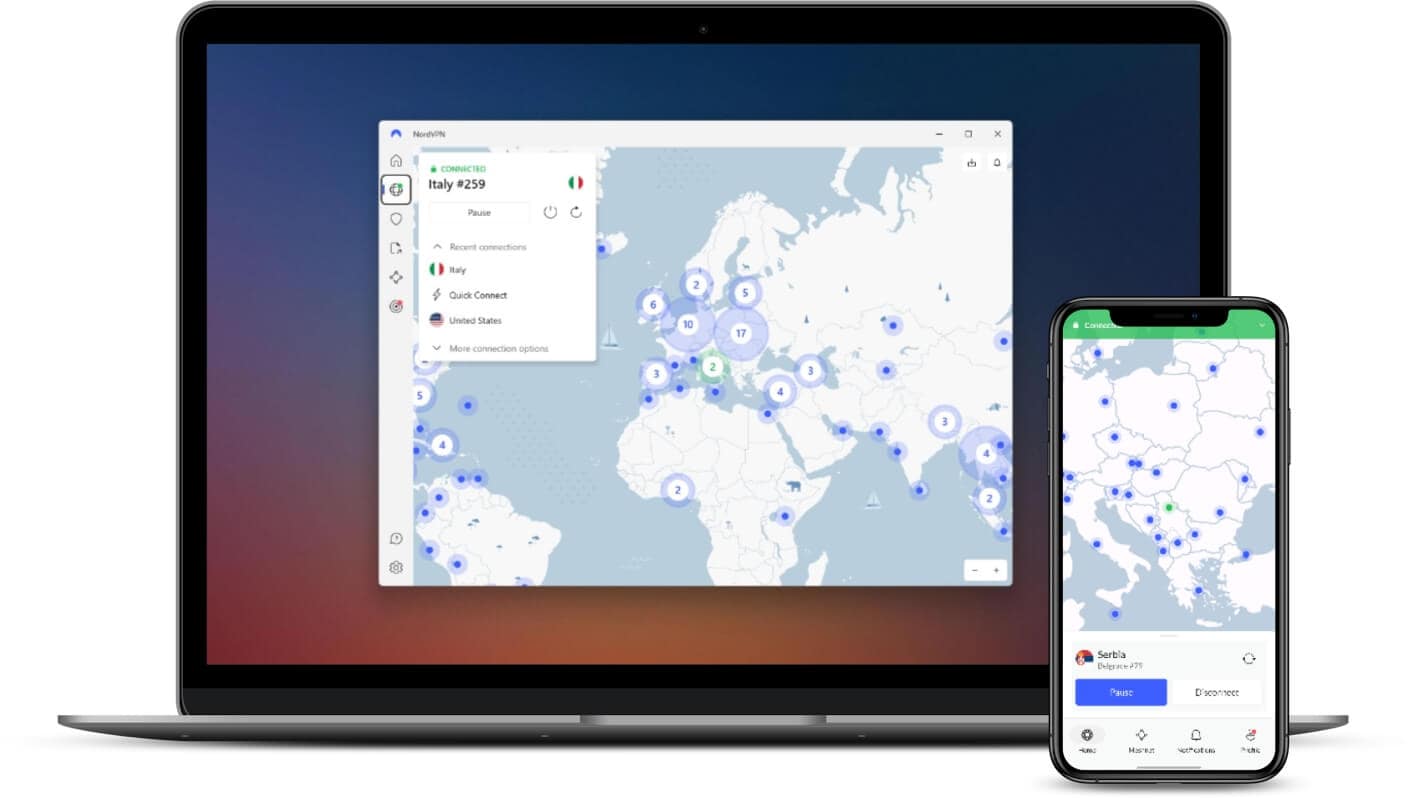
NordVPN hits the sweet spot for users who want top-tier privacy without messing up their bank access. With fast US servers, leak-proof protection, and built-in threat blocking, it’s built for secure sessions that don’t raise red flags.
NordVPN is loaded with the right mix of features for online banking. Its Threat Protection blocks phishing domains, trackers, and malware before they ever reach your browser. That’s huge when you’re checking your bank account on public Wi‑Fi or browsing through financial emails. And its RAM-only servers mean no data gets stored ever.
In our tests with NordVPN, it worked flawlessly with major platforms like Revolut, U.S. Bank, HSBC, and even more sensitive apps like Monzo and Capital One, which are known to be finicky with VPN connections.
We ran NordVPN through login tests on desktop and mobile. On mobile banking apps, we used split tunneling to exclude SMS-based 2FA apps from the VPN, and it worked perfectly. No delays, no missed codes. Connecting to nearby US servers kept our IP location consistent, so we never hit login blocks or “unusual activity” alerts.
Its NordLynx protocol gave us consistently fast speeds even on 4G hotspots, which helped us load encrypted banking sessions quickly without timeout errors. And when we deliberately killed the connection, NordVPN’s kill switch stepped in smoothly to prevent any data leaks mid-session.
You can run NordVPN on up to 10 devices at once, and it works across all platforms, including Windows, iOS, Android, and macOS. It starts at around $3 per month on a long-term plan, which is solid considering the security stack it comes with. And its no-logs policy has been independently audited multiple times, so your activity stays yours.
Pros
- Threat Protection for phishing and malware protection
- No-logs verified by third-party audits
- Best speeds
- Works with a wide range of banks
- Kill switch and DNS leak protection
- Affordable long-term plans
- Robust global network
Cons
- May need to reverify 2FA on first VPN use
2. ExpressVPN — Best for Consistent Access
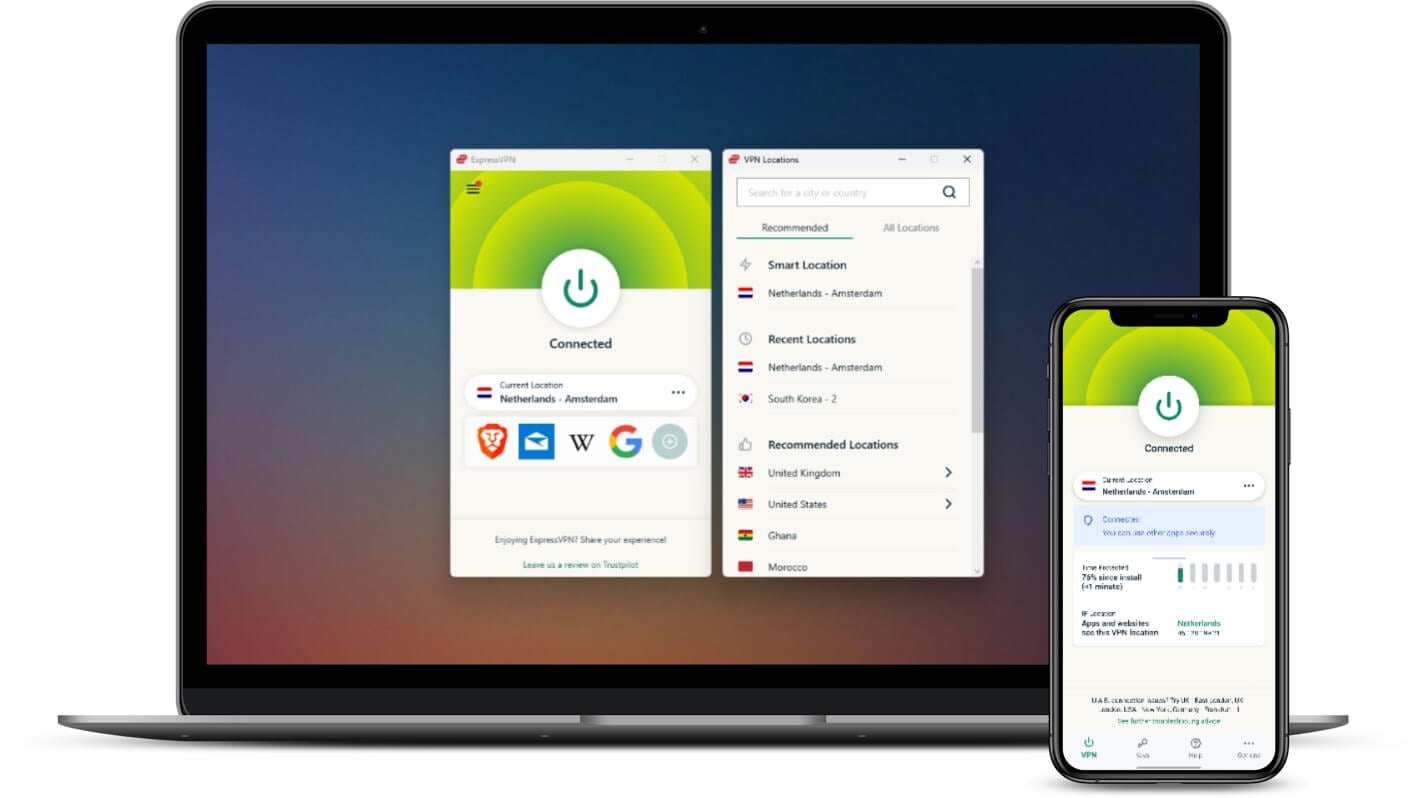
ExpressVPN is all about smooth, secure banking without surprises. During our tests, it worked seamlessly with platforms like Chase, Wells Fargo, and PayPal, even on strict mobile apps that usually hate VPNs. What makes it stand out is how consistently it maintains session stability, even during network switches or device hops. We logged in from both mobile and desktop on hotel Wi‑Fi, and ExpressVPN never dropped the ball.
Its Lightway Turbo protocol is what keeps everything running fast and lean. Even when switching from Wi‑Fi to mobile data mid-session, we didn’t hit any banking timeouts or forced logouts. For anyone who moves around a lot, this reliability can’t be overstated. ExpressVPN also runs on RAM-only TrustedServer infrastructure, which erases all data with every reboot. No logs, no leftovers, no risks.
While some VPNs get flagged due to overused or shared IPs, ExpressVPN’s US servers seemed fresh every time. We didn’t encounter any location mismatches, even on more sensitive platforms. It also comes with a Network Lock kill switch, so if your connection drops unexpectedly, your banking session doesn’t leak data into the wild. That peace of mind alone makes the slightly higher price tag feel worth it and starts at just around $5 per month on an annual plan.
We also liked how easy it was to use across all devices. The app is clean, fast, and doesn’t bury you in options. Whether you’re banking from an iPhone, Android tablet, or Windows laptop, ExpressVPN delivers that click-and-go experience, making it one of the most reliable VPN for banking on the list.
Pros
- Lightway keeps sessions stable
- RAM-only servers so nothing is stored
- Works with Chase, Wells Fargo, and others
- Clean, intuitive apps across major devices
- Kill switch for unexpected disconnects
- Servers in 105 countries
Cons
- Slightly pricier than others
- No split tunneling on iOS
3. Private Internet Access — Most Customizable VPN for Banking
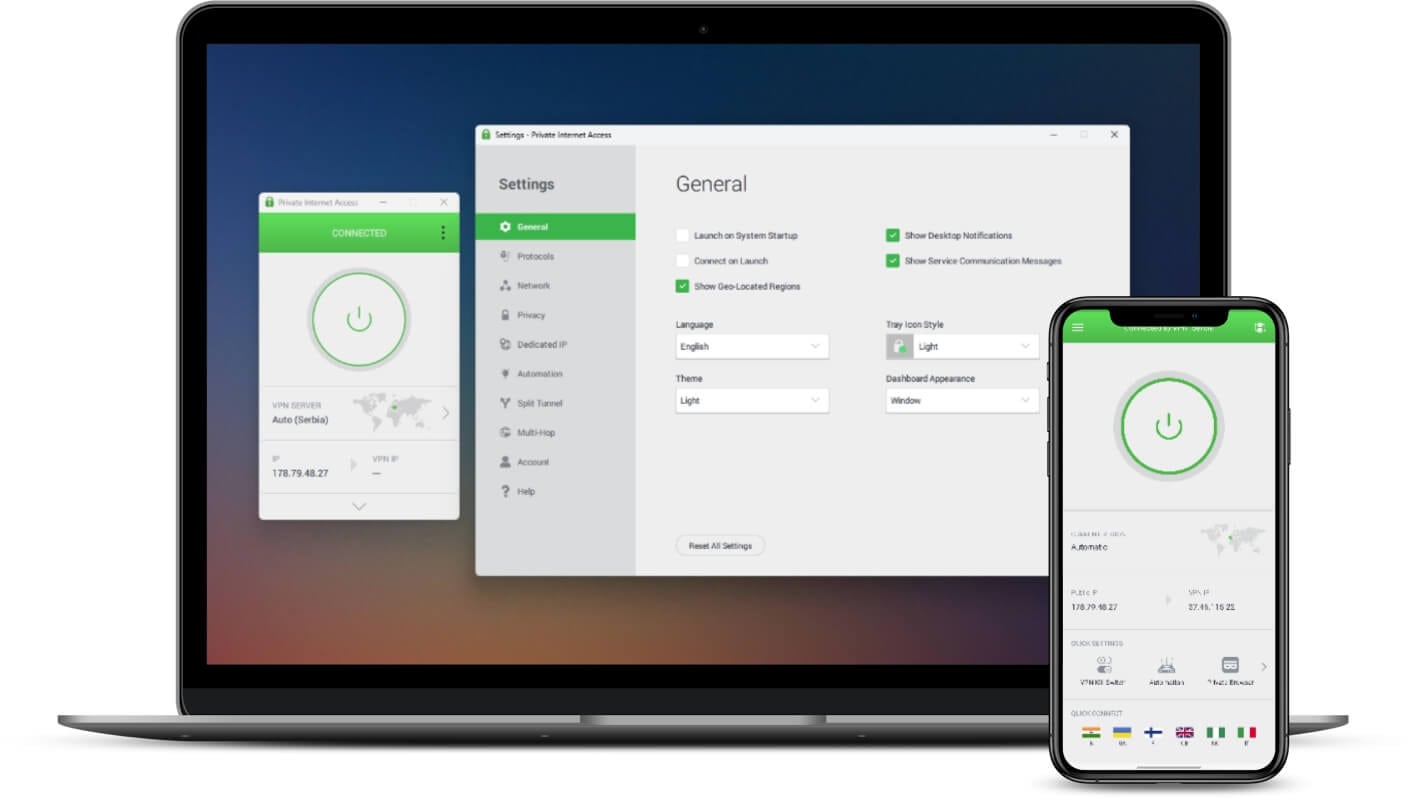
Private Internet Access is built for control freaks, and that’s a good thing when it comes to online banking. Unlike many VPNs that go for plug-and-play simplicity, PIA lets you customize nearly everything, from encryption levels to DNS preferences. We used it to fine-tune connections for different banks, and it handled them all without raising red flags.
One of the biggest standouts is that PIA offers servers in every US state, including some underrepresented ones like Idaho and South Dakota. This broad spread helped us avoid fraud alerts when logging in from smaller regions. It also means you can stay close to your actual location while keeping your IP address private, which is a key detail if your bank watches for IP mismatches.
On the security side, it’s just as solid. Private Internet Access has a strict no-logs policy that’s been proven in court, plus open-source apps that anyone can audit. In our tests, the kill switch worked as expected, and we saw no IP, DNS, or WebRTC leaks, even during forced disconnects. Mobile banking apps like Capital One, Discover, and regional credit union portals all worked without glitches.
What surprised us most was the speed. We got steady, reliable performance on both OpenVPN and WireGuard, with WireGuard offering slightly faster loads for banking apps. We also appreciated PIA’s MACE feature, which blocks trackers and scripts that might be lurking on financial sites.
Private Internet Access starts at just over $2 per month with a long-term plan, which makes it one of the most affordable options in this lineup. And with support for unlimited devices, it’s ideal for shared households or power users juggling multiple gadgets.
Try Private Internet Access Now
Pros
- Servers in all 50 US states for consistency
- Open-source apps and a no-logs policy
- Great speeds with WireGuard
- MACE blocks adware and trackers
- Affordable with unlimited connections
Cons
- Interface could be overwhelming for newbies
- No RAM-only server infrastructure
4. Surfshark — Best for Multi-Device Banking With Extra Privacy
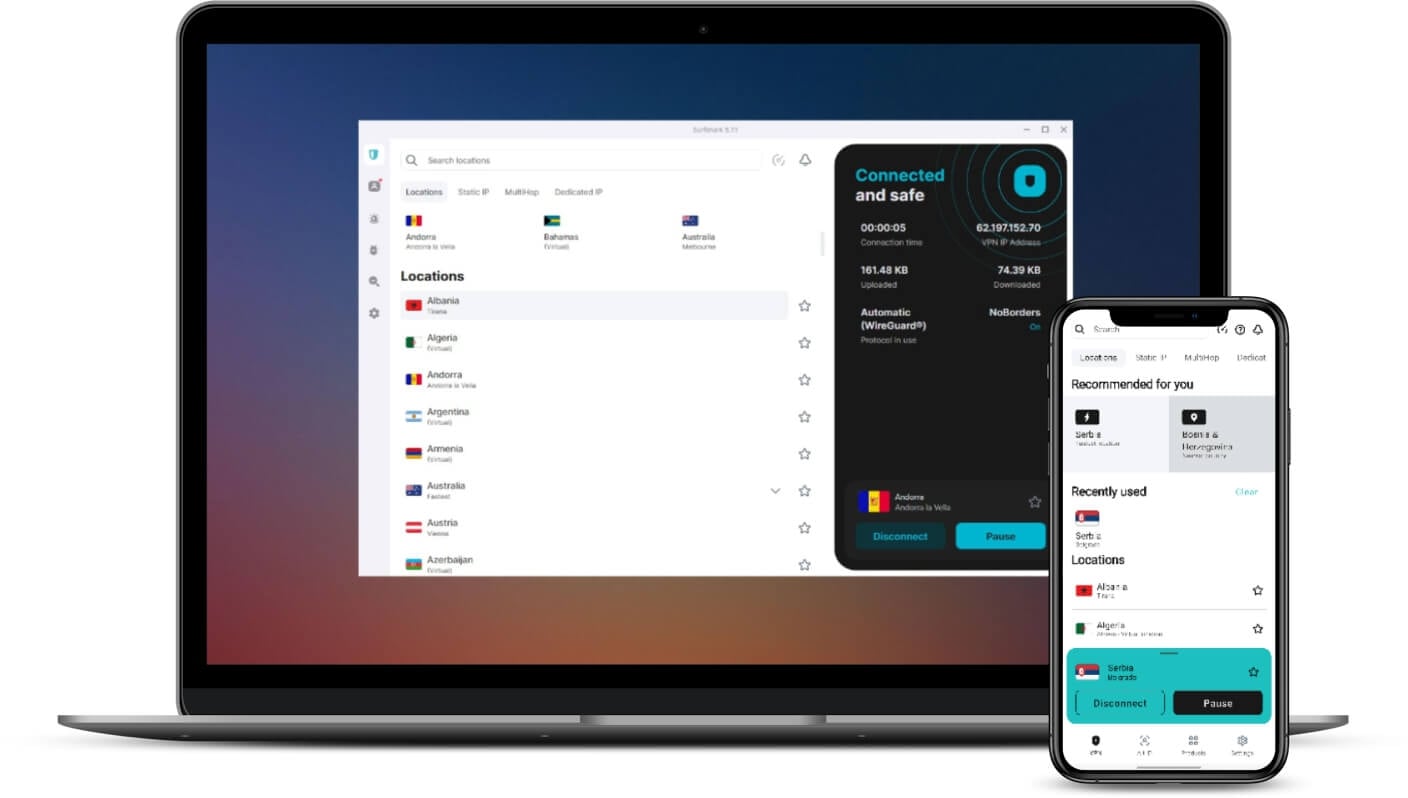
If you’re banking on more than one device, or want your whole household covered, Surfshark is the most flexible pick. It’s one of the only VPNs allows unlimited connections, so you can secure your phone, laptop, tablet, and even your parents’ devices without juggling logins or bumping into limits.
During tests, Surfshark worked smoothly with banks like Ally, Huntington, and Navy Federal, both through browsers and mobile apps. We didn’t hit any login loops or location mismatch errors. And since Surfshark has servers in plenty of mid-sized US cities, we were able to stay geographically close to our real location, which helped avoid any 2FA hiccups.
Its CleanWeb feature is a quiet winner here. It blocks ads, trackers, and malware, keeping shady scripts off your bank’s login pages. That extra layer of protection is especially helpful when banking over public Wi‑Fi or when someone else in the house might click the wrong link.
Speed-wise, Surfshark runs fast and stable, especially when paired with WireGuard. Sessions loaded quickly, even during off-peak hours or while tethering on mobile. On Android, you can even turn on GPS spoofing, which makes your device location match your VPN IP, a handy trick for mobile banking apps that double-check both.
Pricing starts at around $2.50 per month, which is a great value considering all the extras it offers. For privacy-conscious users who don’t want to overthink things, Surfshark offers simplicity, speed, and smart protection in one.
Pros
- Unlimited device connections
- CleanWeb blocks shady page scripts
- Works well with mobile-first banks
- Budget-friendly with premium features
Cons
- No RAM-only servers
- Fewer deep customization options
5. Proton VPN — Best Free VPN for Banking
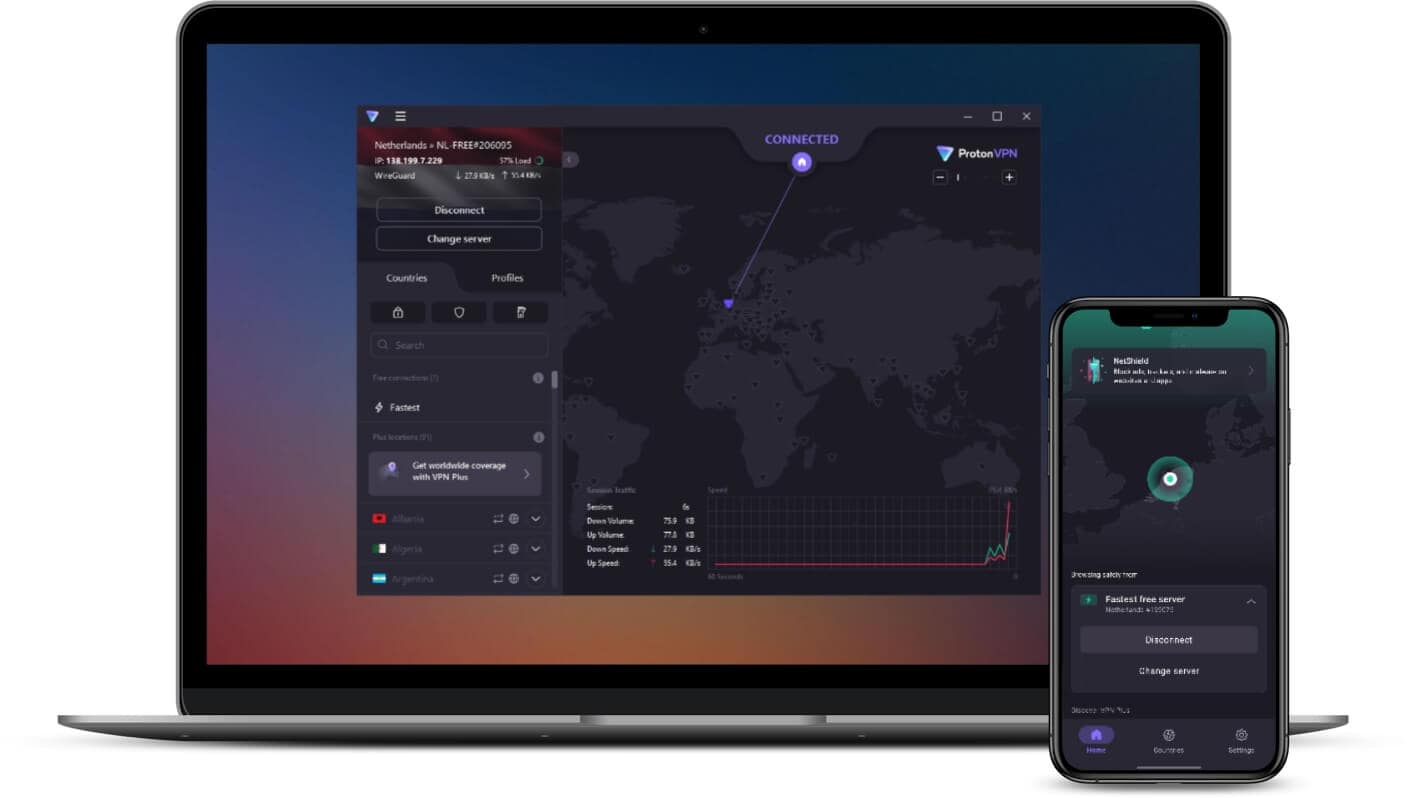
Proton VPN is the only provider on this list that gives you a way to bank securely without paying a cent upfront, which makes it a solid entry point for privacy-conscious users. But let’s be clear, if you’re serious about consistent banking access, you’ll want to upgrade to the Plus plan.
We tested both tiers, and while the free version delivered encrypted, leak-free connections across a handful of US servers, it didn’t always play nice with every banking platform. Load times were slower, and some mobile apps got stuck during login. But once we switched to the Plus plan, everything opened up. High-speed servers, priority routing, and better uptime meant smooth logins on Revolut, N26, Chase, and several other apps known to be picky.
Proton VPN is based in Switzerland, where strict privacy laws back its no-logs policy, and all apps are open source and independently audited. It also runs Secure Core servers, which route your traffic through privacy-safe countries before exiting, which is a useful feature for anyone worried about surveillance or tracking at the ISP level.
Proton VPN doesn’t overload you with features, but it nails the ones that matter for banking: DNS and IPv6 leak protection, a reliable kill switch, and multi-hop routing for extra-sensitive sessions. On the Plus plan, speeds were strong even on mobile, and we didn’t run into any two-factor delays or flagged logins.
The free version is a solid start if you’re banking casually or just want encryption on public Wi‑Fi, but the Plus plan (around $3 a month) is where it really becomes a serious tool for financial privacy. That said, even with its paid plan, Proton VPN still falls short of the service offered by NordVPN.
Pros
- Only free VPN on the list with no data limits
- Based in Switzerland with a no-logs policy
- Secure Core adds an extra privacy layer
- Open-source apps and regular audits
Cons
- Free version is inconsistent for banking
- No dedicated IPs, even on premium
Common Banking Errors With VPNs (and How to Avoid Them)
Using a VPN for online banking sounds smart, until your bank decides it’s suspicious. If you’ve ever been blocked mid-login or forced into extra verification, chances are your VPN setup triggered some red flags. Fortunately, these issues are avoidable with the right strategy.
1. “Suspicious login attempt” alerts
Banks have fraud detection systems that monitor your IP address, device, and location history. If you log in from a VPN server in a different state or country than usual, even once, it can trigger security alerts. To avoid this, always use the same city-level server, ideally near your actual location. Stick with VPN providers that offer reliable US server options without constant IP rotation, like NordVPN.
2. Two-factor authentication (2FA) failure
Some banking apps require SMS or email verification that can get blocked or delayed when you’re connected through a VPN. Using split tunneling (where your VPN bypasses the banking app or SMS service) helps keep 2FA running smoothly. Most top-tier VPNs support this feature on mobile and desktop.
3. Login loops or site errors
Have you ever tried to log in, only for the page to reload endlessly or throw an error? That’s often due to banks detecting a VPN IP range associated with data centers or shared use. Free VPNs or smaller providers are most prone to this. To avoid it, choose a VPN with dedicated or frequently refreshed IP pools, like ExpressVPN or Proton VPN’s Plus plan.
4. Location mismatches on mobile banking apps
Apps often compare your device’s GPS location with your IP address. If the two don’t match, you might get booted or blocked. Some VPNs, like Surfshark, offer GPS spoofing on Android to align both signals. Otherwise, your safest bet is to use a nearby VPN server and keep location services turned off while banking.
5. CAPTCHA and bot checks
If your bank suddenly starts asking you to “verify you’re human,” it’s likely because your VPN IP was flagged for suspicious activity. This is common with overused or blacklisted servers, especially on free VPNs. Switch to a lower-traffic location or a premium provider to reduce the friction.
Final Thoughts
A good VPN for banking is about trust, consistency, and not getting locked out when you need access most. The right one keeps your IP stable, your traffic leak-free, and your sessions smooth, no matter where you’re logging in from.
While every VPN on this list offers something useful, NordVPN stands out as the most well-rounded choice.
Between its Threat Protection feature, fast NordLynx protocol, and strong record with finicky banking platforms, it hits the mark for both privacy and usability.





